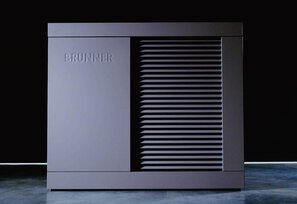GENERAL SALES AND DELIVERY TERMS
ULRICH BRUNNER GMBH
The basis of a permanent and lasting business relationship is not delivery and payment terms, but cooperation and mutual trust. Nevertheless, we cannot avoid regulating the following points:
1. Validity of the General Terms and Conditions of Sale and Delivery
The Supplier's offers, acceptance of orders and all deliveries shall be made exclusively on the basis of the following "General Terms and Conditions of Sale and Delivery". The Purchaser's terms and conditions of purchase are hereby expressly rejected; they shall not bind the Supplier even if the Purchaser does not object to them again upon conclusion of the contract.
2. Offer and conclusion of contract
The Supplier's offers are made without engagement and subject to the Supplier's written confirmation, unless otherwise expressly stipulated in writing. Documents belonging to an offer, such as illustrations, drawings and weight specifications as well as more detailed descriptions, are only approximately authoritative and serve to describe and define the delivery item more precisely. The same applies to performance and consumption data. These specifications do not constitute a guarantee for the quality or durability of the delivery item. The supplier reserves the right to make changes to the dimensions and weights of the delivery item until delivery.
3. Agreement
Should the Supplier commission a subcontractor (e.g. parcel service) for shipments of goods, the Customer agrees that the e-mail address provided by the Customer may be transmitted by the Supplier to the subcontractor and may be used by the subcontractor in the context of the delivery. This consent may be revoked by the Purchaser at any time. The customer should note that in the event of revocation, he will no longer be able to directly influence the delivery of the goods being shipped. Any revocation must be sent to the address: info@brunner.de.
4. Prices and payments
a) Prices are ex delivery works without packaging and transport and do not apply to repeat orders.
b) Prices are based on the production costs at the time of the Supplier's written confirmation. If these production costs increase by the time of delivery due to an increase in taxes, prices for raw materials, auxiliary materials, energy, freight or wages, the Supplier shall be entitled to adjust the agreed price accordingly. The individual cost elements and their increase must be weighted appropriately when forming the new price. If individual cost elements increase while others decrease, this shall also be taken into account when determining the new price. The customer's right to withdraw from the contract cannot be derived from such a price increase.
c) If, on a delivery date which is 8 weeks after conclusion of the contract, changes occur in the price basis, as described above under b), the Supplier reserves the right to adjust the price accordingly after informing the Purchaser. In this case, too, the individual cost elements and their increase must be weighted appropriately when forming the new price; if individual cost elements increase while others decrease, this must also be taken into account when forming the new price. The customer's right to withdraw from the contract cannot be derived from such a price increase.
d) The agreed delivery price plus statutory value added tax shall be due for payment upon receipt of the invoice, notwithstanding any other agreement. Payments to travelers or representatives of the supplier are not permitted without written authority to collect. Packaging, transport and assembly costs are due for payment net immediately upon receipt of the invoice.
5. Invoicing
a) The customer agrees that his invoice will be sent to him electronically via e-mail. The invoice is valid without signature.
b) The customer shall ensure on the recipient side that all electronic deliveries of the invoice by e-mail can be properly delivered to the e-mail address provided by the customer and shall adapt technical facilities such as filter programs or firewalls accordingly. Any automated electronic replies (e.g. absence notes) cannot be taken into account and do not prevent valid delivery.
c) The customer shall immediately notify us in writing and in a legally valid manner of any change in the e-mail address to which the invoice is to be sent. Invoices sent to the e-mail address last notified by the customer shall be deemed to have been received by the customer if the customer has not notified a change in its e-mail address.
d) The customer may revoke participation in the electronic delivery of the invoice by e-mail at any time in writing. After receipt and processing of the written revocation, the customer will receive invoices in the future by post to the last known postal address. The Supplier reserves the right to charge a handling fee for postal delivery.
6. Set-off and right of retention
Offsetting against counterclaims is only permitted with undisputed, legally established or recognized claims, as well as those based on the same contractual relationship.
The exercise of a right of retention is only permissible in the case of undisputed, legally established or recognized counterclaims and those based on the same contractual relationship.
7. Delay
a) Statutory interest shall be charged if the payment deadlines are exceeded or in the event of a subsequent deferral.
b) If the Purchaser fails to honor a check or bill of exchange or if the Supplier becomes aware of a significant deterioration in the Purchaser's circumstances which jeopardizes the claim for payment, the entire remaining debt shall become due, even if bills of exchange with a later maturity date are outstanding. If the entire remaining debt is not paid immediately, the Purchaser's right to use the delivery item shall expire. The Supplier shall be entitled either to repossess the delivery item without waiving its claims until they have been satisfied or to withdraw from the contract. If the delivery item is taken away, all costs shall be borne by the Purchaser. In the event of withdrawal from the contract, the Purchaser shall compensate the Supplier not only for the use of the delivery item, but also for any loss in value through no fault of the Supplier, and for any loss of profit.
c) If the Purchaser also otherwise fails to meet its payment obligations after a reminder has been sent setting a reasonable deadline for payment, the Supplier shall be entitled to repossess the delivery item or to withdraw from the contract.
8. Delivery time
a) The delivery period shall commence on the date of dispatch of the order confirmation and shall be deemed to have been met if the goods have left the factory by the end of the delivery period.
b) If, for reasons for which we are not responsible, we do not receive deliveries or services from our sub-suppliers or from subcontractors, despite proper congruent coverage (i.e. in quantity and quality in accordance with the delivery agreed with the customer), or do not receive them properly or on time, or if events of force majeure occur, i.e. impediments to performance through no fault of our own with a duration of more than 14 calendar days, we shall inform our customer in writing in good time. In this case, we shall be entitled to postpone the delivery or service for the duration of the impediment or to withdraw from the contract in whole or in part due to the part not yet fulfilled, provided that we have complied with our aforementioned duty to inform and have not assumed the procurement risk or manufacturing risk and the impediment to performance is not only of a temporary nature. Force majeure shall be deemed to include strikes, lockouts, official interventions, shortages of energy and raw materials, transport bottlenecks through no fault of our own, operational hindrances through no fault of our own, e.g. due to fire, water and machine damage and all other hindrances which, viewed objectively, have not been culpably caused by us.
c) If a delivery or performance date or a delivery or performance period has been agreed as binding and if, due to events in accordance with § 6 para. (1) above, the agreed delivery or performance date or the agreed delivery or performance period is exceeded by more than four weeks, or if, in the case of a non-binding performance date, it is objectively unreasonable for the customer to adhere to the contract, the customer shall be entitled to withdraw from the contract with respect to the part not yet performed. Further rights of the customer, in particular claims for damages, do not exist in this case.
d) The aforementioned circumstances are also not the responsibility of the Supplier if they arise during an already existing delay.
If the Purchaser incurs damage due to a delay caused by the Supplier's own fault, the Purchaser shall be entitled to claim compensation for the delay to the exclusion of any further claims. Such compensation shall amount to 0.5 % for each full week of delay, but in total not more than 5 % of the value of that part of the total delivery which cannot be used in due time or in accordance with the contract as a result of the delay.
The contracting parties shall be at liberty to prove higher or lower storage costs. Compliance with the delivery period requires the fulfillment of the contractual obligations of the purchaser.
9. Transfer of risk and acceptance
The risk shall pass to the Purchaser at the latest upon dispatch of the delivery item, even if partial deliveries are made or the Supplier has assumed other services. At the request of the Purchaser, the shipment shall be insured by the Supplier against theft, breakage, transport, fire and water damage as well as other insurable risks at the Purchaser's expense.
If the shipment, which may be effected by rail or forwarding agency at the Supplier's discretion, is delayed due to circumstances for which the Purchaser is responsible, the risk shall pass to the Purchaser from the day of readiness for shipment; however, the Supplier shall be obliged, at the request and expense of the Purchaser, to effect such insurance as the Purchaser may require. Delivered items shall be accepted by the Purchaser, even if they show minor defects, without prejudice to the rights under Clause 7.
Partial deliveries are permissible.
10. Liability for defects of the delivery
a) Warranty claims of the Purchaser shall require that the Purchaser has duly complied with its obligations to inspect the goods and to give notice of defects pursuant to § 377 of the German Commercial Code (HGB).
b) If the goods are defective, they shall be repaired or replaced at the Supplier's discretion; replaced parts shall become the property of the Supplier.
c) No warranty is given for damage caused by improper installation, improper care, improper connection natural wear and tear or replacement materials.
d) In the case of warranty, i.e. rectification of defects or new delivery, the Supplier shall bear all expenses necessary for the purpose of rectifying the defect, in particular transport, travel, labor and material costs, unless these are increased by the fact that the goods have been taken to a place other than the place of performance.
If the subsequent performance fails, the Purchaser may, at its option, demand a reduction of the purchase price or rescind the contract and, if the prerequisites are met, also claim damages or reimbursement of expenses incurred in vain. A deadline for subsequent performance need not be set if the Supplier seriously and finally refuses performance, if the Supplier has failed to perform on the date specified in the contract and within a specified period, and if the Purchaser has tied the continuation of the interest in performance to the timeliness of performance. The Buyer shall also be entitled to the above rights if the Supplier refuses to effect subsequent performance or if such subsequent performance is unreasonable for the Buyer.
11. Liability
The Supplier shall be liable without limitation for damages resulting from injury to life, body or health caused by a negligent or intentional breach of duty by the Supplier or also by an intentional or negligent breach of duty by a legal representative or vicarious agent.
The Supplier shall further be liable without limitation for any other damage caused by a grossly negligent breach of duty by the Supplier or a wilful or grossly negligent breach of duty by a legal representative or vicarious agent.
The Supplier shall also be liable if the law makes this mandatory, such as the Product Liability Act.
In the event of other damage to property and financial loss caused by negligence, the Supplier shall also be liable for legal representatives and vicarious agents only in the event of a breach of a material contractual obligation; material contractual obligations are those whose performance characterizes the contract and on which the Purchaser may rely.
In the case of liability for essential contractual obligations, the amount of damage shall be limited to the damage foreseeable at the time of conclusion of the contract and typical for the contract.
In all other respects, liability - on whatever legal grounds - is excluded; the above provisions also apply to claims arising from culpa in contrahendo.
12. Limitation
Warranty claims are subject to a limitation period of one year from the transfer of risk, but the statutory period applies when the law prescribes a longer period for claims for material defects in buildings and for items for buildings, as well as for the purchaser's right of recourse under § 478, 479 BGB.”
The statutory limitation period shall also apply in cases of injury to life, body or health as well as intentional or grossly negligent breach of duty by the Supplier and fraudulent concealment of a defect.
13. Retention of title
a) The Supplier retains title to the goods until receipt of all payments under the contract. The Purchaser is obliged to treat the goods with care, and in particular to insure them at its own expense against fire, water and theft at replacement value. Any maintenance and inspection work must be carried out by the Purchaser in good time and carefully at its own expense.
b) In the event of seizure, attachment or other access by third parties, the Purchaser shall notify the Supplier in writing without undue delay in order to enable the Supplier to exercise its rights under the retention of title. In the event of a breach of this, the Purchaser shall be liable for any loss incurred by the Supplier.
c) The Purchaser shall be entitled to resell the goods in the ordinary course of business; however, it hereby assigns to the Supplier all claims in the amount of the gross purchase price of the Supplier's claim to which it is entitled from the resale of the goods. This shall apply irrespective of whether the goods are resold without or after processing. The customer shall remain authorized to collect the claims even after assignment; this shall not affect the right of the supplier to disclose the assignment of claims and to collect the claims himself. This shall not be done as long as the Purchaser meets its payment obligations, is not in default of payment and no application is made to open composition or insolvency proceedings. In this case, the Contractor shall be obliged to immediately provide the Supplier with all necessary information on its purchasers and to hand over the necessary documents and to enable the Supplier to disclose the assignment.
d) The processing or transformation of the goods by the Purchaser shall always be carried out for the Supplier. If the goods are processed with other items not belonging to the Supplier, the latter shall acquire co-ownership of the new item in the ratio of the value of its own claim to the other processed items at the time of processing. The retention of title shall continue to apply in full to the item created by processing. The purchaser is authorized to resell the goods subject to retention of title within the scope of his business operations. The Purchaser hereby assigns to the Seller its claims arising from a resale of these reserved goods, irrespective of whether the reserved goods are resold unprocessed or processed.
e) If the delivered goods are inseparably mixed with other items not belonging to the Supplier, the Supplier shall in turn acquire ownership of the new item in the ratio of the value of the purchased item to the other mixed items at the time of mixing. If the mixing takes place in such a way that the Purchaser's item is to be regarded as the main item, the Purchaser shall transfer co-ownership to the Supplier on a pro rata basis, and the Purchaser shall hold the Supplier's sole or co-ownership in safe custody for the Supplier.
f) If the delivered goods or objects or items manufactured therefrom are resold by the Purchaser or installed directly or after modification in a property of a third party in such a way that they become essential components of the property of the third party, the claims of the Purchaser against its customer or third parties replacing these items shall pass to the Supplier as security for its claims without a special declaration of assignment being required.
g) The Supplier shall release securities to which it is entitled at the Purchaser's request to the extent that the realizable value of the securities exceeds the claims to be secured by more than 10 %; the Supplier shall be responsible for selecting the securities to be released.
14. Miscellaneous
a) The contract shall remain binding in its remaining parts even if individual provisions are legally ineffective; the ineffective provision shall be replaced by a provision that comes as close as possible to the economic intention.
b) If the Purchaser is a merchant within the meaning of the law, the Supplier's place of business shall be agreed as the place of jurisdiction for all disputes arising directly or indirectly from the contractual relationship; the Supplier shall, however, be at liberty to bring an action at the Purchaser's place of business.
c) The legal relations in connection with this contract shall be governed by German substantive law to the exclusion of the United Nations Convention on Contracts for the International Sale of Goods (CISG).
d) All other possible agreements outside of the order confirmation must be agreed upon in writing between the Contractor and the Client; this also applies to changes and/or ancillary agreements before or after the conclusion of the contract or the order confirmation. This shall also apply to any cancellation of this written form requirement. The order shall remain valid even if individual provisions are otherwise ineffective; the ineffective provision shall be replaced by a provision that comes as close as possible to what was intended in economic terms.














